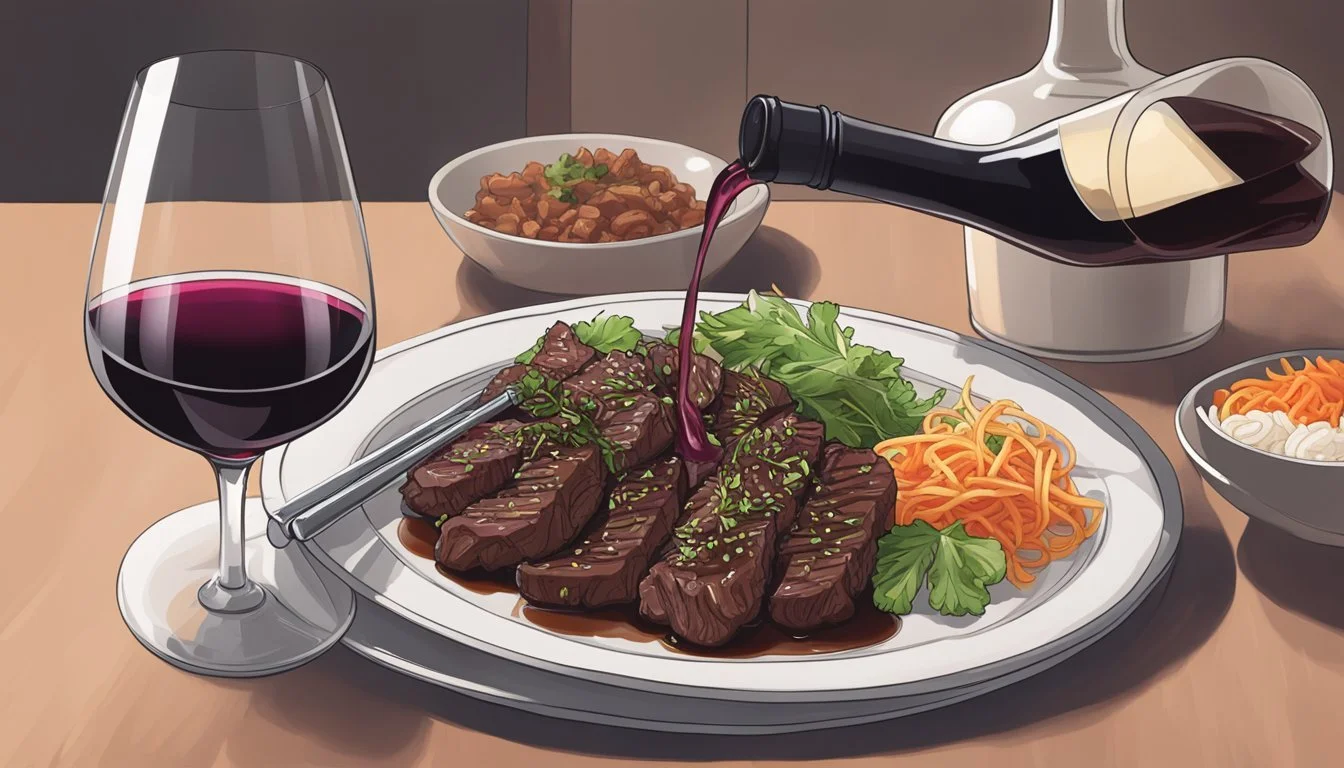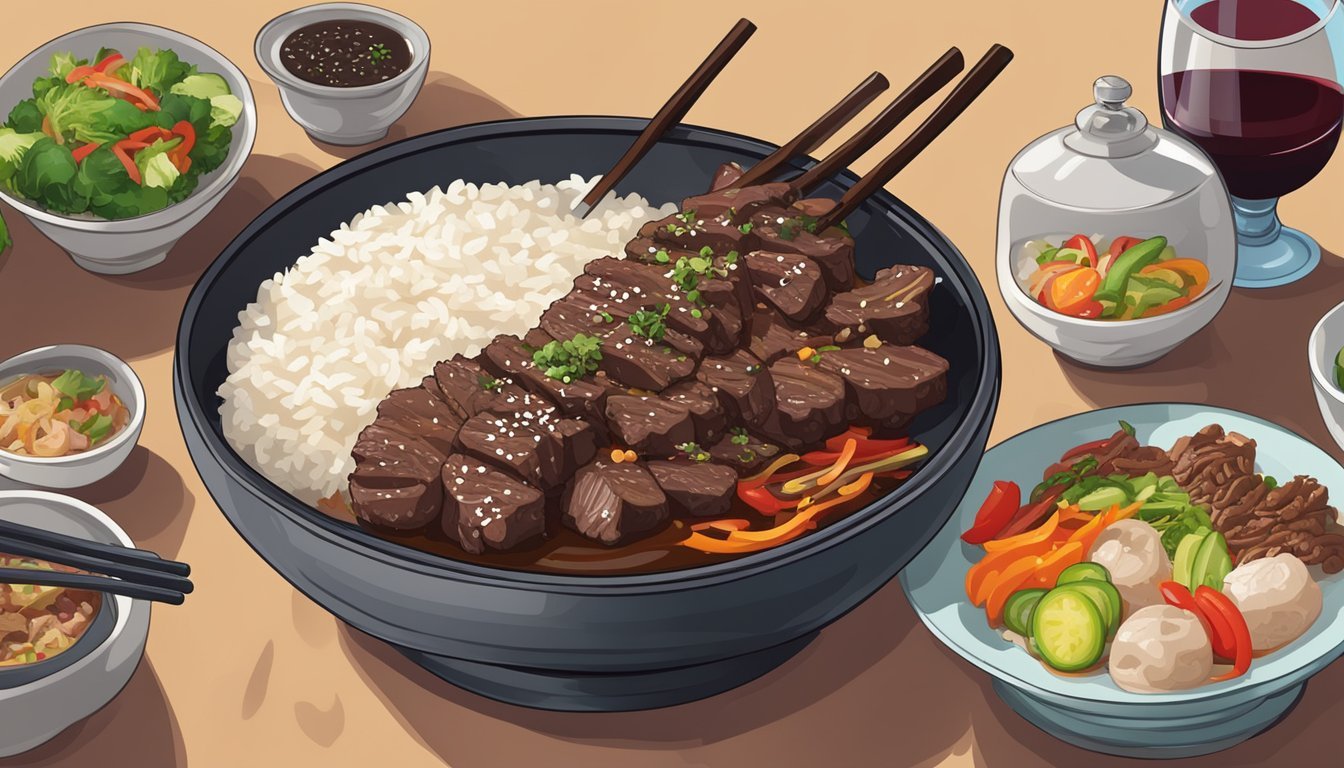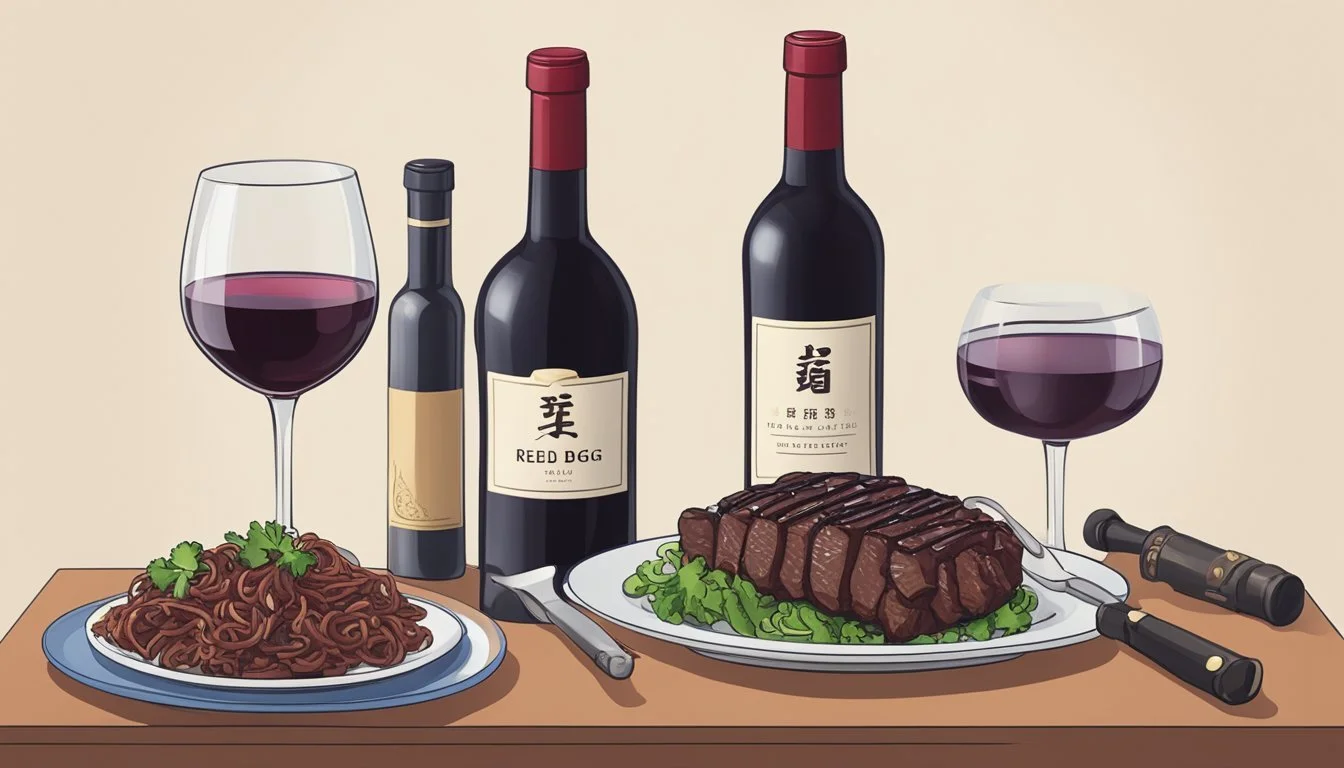What Wine Goes Well with Beef Bulgogi
Expert Pairing Guide
Beef bulgogi (What wine goes well with beef bulgogi?), a classic Korean dish known for its tender slices of marinated beef, presents unique flavors that make wine pairing an exciting challenge. The dish is characterized by a harmony of sweet and savory notes, achieved through a marinade that includes soy sauce, sugar, sesame oil, and garlic. This combination of flavors requires careful consideration when selecting a wine, as the ideal pairing should complement the dish's depth without overpowering its distinctive taste.
Selecting the appropriate wine to accompany beef bulgogi involves balancing the robust elements of the marinade with the wine's acidity, tannins, and fruit notes. A crisp, unoaked Chardonnay or a light-bodied Pinot Grigio can enhance the flavors of bulgogi by cutting through the dish’s richness while adding refreshing notes that cleanse the palate. For those who prefer red wine, a fruit-forward Malbec from Argentina can stand up to the boldness of the beef while its inherent sweetness and moderate tannins can meld harmoniously with the dish’s savory marinade.
Understanding Bulgogi
Bulgogi, a classic Korean dish, has captivated palates worldwide with its unique blend of flavors and grilling technique. The dish primarily features thinly sliced beef in a sweet and savory marinade, showcasing the harmony of traditional Korean ingredients.
Origins of Bulgogi
Bulgogi translates to "fire meat," tracing its origins back to Korea's Goguryeo era. This historical delicacy has evolved over centuries, cementing itself as a staple of Korean cuisine. Initially prepared for the nobility, it has gained widespread popularity and is now enjoyed by people from all walks of life.
Key Ingredients and Flavors
The core component of bulgogi is the beef that is typically marinated to enhance tenderness and taste. A crucial element of the marinade includes soy sauce for umami depth, sugar for a hint of sweetness, and sesame oil which imparts a nutty aroma. Other ingredients like garlic, pear purée, and green onions contribute to the flavor profile, often finished with a sprinkle of sesame seeds. This complex mix of components creates a balanced interplay of sweet, savory, and subtle hints of spice.
Marinade Ingredients:
Soy sauce
Sugar
Sesame oil
Pear purée
Garlic
Green onions
Sesame seeds
Traditional Bulgogi Recipe
The traditional method of preparing bulgogi involves marinating the beef for several hours, ensuring the flavors are fully absorbed. Once marinated, the meat is then typically grilled. The grill is not merely a cooking method but a contributor to the subtle smoked flavor that is highly prized. Traditionally cooked on an open flame, contemporary practices can involve grilling on a stovetop pan or even broiling. The ideal presentation of bulgogi offers a delightful char, with the meat maintaining its succulence and capturing the essence of its marinade.
Cooking Method:
Marinate for several hours or overnight
Grill over open flame or use a pan/stovetop grill
Aim for slight char while keeping meat tender
The Art of Wine Pairing
The perfect wine pairing enhances both the dish and the wine itself, allowing the flavors in each to shine. The subsections below explore fundamental aspects of pairing wine with food, specifically with a focus on beef bulgogi.
Principles of Pairing Wine with Food
When selecting a wine to pair with a particular dish, one must consider how the flavors will interact. The aim is to either complement or contrast the flavors of the wine and the food. With beef bulgogi, which features a combination of savory and sweet with a hint of smoke, one should look for a wine that balances these elements without overpowering them.
Complementary pairings: An example might be a fruity red wine with enough acidity to cut through the richness of the bulgogi's marinade.
Contrast pairings: A slightly sweeter white wine could counterbalance the dish's savory notes, highlighting both the wine's sweetness and the meat's savoriness.
Impact of Acidity and Tannins on Wine Pairing
Acidity in wine can provide a refreshing counterbalance to rich, fatty dishes (What wine goes well with fatty dishes?) or act to mirror a dish's own acidic components. Tannins, on the other hand, offer a different sensation that can offset or reduce the perception of fat in food.
Acidic wines: One might choose a high-acid Riesling to accompany beef bulgogi, complementing the dish's own tangy marinade.
Tannin-rich wines: A Malbec, with softer tannins, can soften the dish's spice and enhance its meaty umami qualities.
Role of Wine Body and Sweetness
The body of the wine — whether light, medium, or full — should match the heft of the food. Sweetness in wine operates to soothe the heat of spicy foods (What wine goes well with spicy food?) and to match any sweet elements within the dish itself.
Wine body: For beef bulgogi, a medium-bodied Zinfandel can stand up to the dish's intensity without overwhelming it.
Sweetness: The inherent sweetness in a Chenin Blanc could balance bulgogi's spicy and savory notes, particularly if the marinade includes sugar or pear juice.
In the art of wine pairing, one's knowledge and understanding of these qualities come into play to create a harmonious dining experience.
Selecting Wine for Beef Bulgogi
When choosing wine to complement beef bulgogi, one should consider the dish's sweet and savory flavors, resulting from a marinade typically containing soy sauce, sugar, sesame oil, and garlic. The ideal wine will balance these flavors and enhance the dining experience.
Red Wine Options
For those preferring red wine, certain varieties pair exceptionally well with the flavors of beef bulgogi. Syrah or Shiraz wines are excellent choices for this Korean dish, as their spicy and bold character can stand up to the robust flavors. Similarly, Zinfandel, with its fruit-forward profile and hint of sweetness, also matches well with the caramelization of the meat. Malbec with its plush, ripe fruit flavors and smooth finish, can complement the dish's unique marinade.
White Wine Options
White wines offer a contrasting pairing, which can be quite refreshing. A dry Riesling is a standout option, as its crisp acidity contrasts the dish's sweetness while complementing its savory elements. Sauvignon Blanc, with its herbal undertones and zippy acidity, can also cut through the dish's rich flavors, while Gewürztraminer, known for its aromatic profile, offers a balance to bulgogi's sweet and umami tastes. Chardonnay is a versatile choice; however, one should select an unoaked or lightly oaked bottle to avoid overpowering the bulgogi.
Rosé and Other Wines
Rosé can be a perfect middle-ground with its versatility and range of styles. A dry rosé, such as Cerasuolo d'Abruzzo Rosato, combines the fruitiness of a red with the crispness of a white, pairing nicely with beef bulgogi's complex flavors. Pinot Gris is another fitting choice, with its balance of sweetness and acidity. These wines offer a refreshing counterpoint to the savory and sweet notes of the dish.
Food and Wine Serving Suggestions
When pairing wine with beef bulgogi, the goal is to complement the dish's sweet and savory flavors without overpowering it. Wine selections should support the key features of the marinade and the smokiness from grilling.
Ideal Side Dishes with Beef Bulgogi and Wine
To enhance the dining experience, one should pair beef bulgogi with side dishes that match well with both the meat and the wine. Rice is a staple, providing a subtle backdrop that allows the flavors of the bulgogi and wine to shine. Kimchi offers a spicy and tangy contrast, while lettuce leaves are perfect for wrapping the bulgogi, adding a fresh, crisp texture. Vegetables such as stir-fried assortments complement the dish with additional savory notes and a variety of textures. Sprinkling toasted sesame seeds or a dab of ssamjang (a flavorful, thick, spicy paste) can elevate the complexity of flavors further.
Here's a list of side dish recommendations:
Steamed white or brown rice
Fresh lettuce leaves for wraps
Kimchi for a tangy, spicy kick
Stir-fried vegetables with a hint of sesame oil
Ssamjang sauce to spice up the wraps
Serving Temperature and Glassware
The serving temperature of wine is crucial to maximize the food pairing. Reds, particularly lighter and more acidic like Pinot Noir, should be served slightly chilled, around 55-60°F (13-16°C). Whites and rosés, such as a Riesling or a Cerasuolo d'Abruzzo respectively, are ideal at a cooler 45-50°F (7-10°C). Glassware also plays a role; red wines flourish in glasses with a larger bowl, while whites and rosés are better in narrower glasses that help preserve their delicate aromas.
Besides wine, traditional Korean beverages such as soju and beer are also common choices that pair nicely with bulgogi due to their clean and crisp flavors which can cut through the richness of the meat.
Here's a simple serving guide:
Wine Type Serving Temperature Glass Type Red Wine 55-60°F (13-16°C) Larger-bowled glass White/Rosé 45-50°F (7-10°C) Narrower glass Soju/Beer Chilled Small shot or pint
Additional Pairing Considerations
Choosing the right wine to enhance the flavors of beef bulgogi involves more than matching sweetness and acidity. A thoughtful consideration of wine labels, regions, and personal taste can elevate the dining experience.
Understanding Wine Labels and Regions
Reading wine labels can be a key to selecting the perfect pairing. For example, an Oregon Pinot Noir is known for its balanced acidity and could complement the tangy and savory notes of Korean BBQ. Wines like Barbera or Chianti from specific regions in Italy offer fruity flavors with a hint of earthiness, pairing well with the grilled elements of the dish. Lambrusco, an Italian sparkling red, can balance the sweetness of bulgogi with its own sweetness and effervescence.
When considering regions, keep in mind the terroir influence. Korean dishes are often bold, and wines from regions with intense flavor profiles, like Oregon's cooler climate for Pinot Noir, tend to be a suitable match for the rich taste of grilled or pan-fried meat.
Oregon: Noted for Pinot Noir, ideal for Korean BBQ.
Italy: Look for Barbera, Lambrusco, or Chianti for a balance of fruit and earthiness.
Barbera: Typically has bright acidity which cuts through the meat's richness.
Lambrusco: Sparkling nature can cleanse the palate, enhancing the bulgogi's flavor.
Chianti: The tannic structure can stand up to the boldness of the marinated beef.
Navigating Personal Preferences in Wine Pairing
Individual tastes play an important part in pairing and should not be overlooked. Those who prefer a lighter wine might enjoy a Chianti with its bright acidity, while someone who enjoys more body and structure could lean toward an Oregon Pinot Noir. For those who favor a touch of sweetness to go along with the caramelization of grilled bulgogi, a lighter red like Barbera can be quite suitable.
One should consider the cooking method when pairing wines with Korean food. (What wine goes well with Korean food?) A beef bulgogi taco with fresh, raw elements might call for a lighter and brighter wine like Chianti. On the other hand, a classic grilled or pan-fried bulgogi can be complemented by a Pinot Noir or a slightly chilled Barbera, aligning with the savory elements and enhancing the meat's rich flavors.
Grilled or pan-fried: Opt for Pinot Noir or Barbera to match the richness.
Bulgogi taco: A fresh pairing with Chianti aligns with the lighter style.
Light body preference: Chianti or Barbera can meet the mark.
Fuller body preference: Oregon Pinot Noir offers a structural depth that matches well.
In selecting a wine, it is essential to balance personal preference with the characteristic flavors of the Korean dish. Whether the preference leans toward red or white, bubbly or still, there is a wine pairing that can complement the complexity of beef bulgogi and satisfy individual palates.
Conclusion
Selecting the ideal wine to accompany beef bulgogi can greatly enhance the dining experience. The marinade's sweet and savory characteristics necessitate a wine that can complement such flavors without overpowering them.
For red wine enthusiasts, a Pinot Noir with higher acidity is recommended. It possesses the subtlety to balance the richness of the bulgogi while harmonizing with its marinade's sweetness.
Rosé lovers should consider a Cerasuolo d'Abruzzo Rosato. Its cherry-like taste and robust raspberry notes provide a refreshing counterpoint to the meat's umami and depth.
White wine options include a crisp, unoaked Chardonnay or a light-bodied Pinot Grigio. Both can cool the palate and offer a counterbalance to the bulgogi's intensity, with the former best suiting the dish's rich flavors and the latter complementing lighter versions of the dish.
Red Wine: Pinot Noir (high in acid)
Rosé: Cerasuolo d'Abruzzo Rosato (cherry and raspberry notes)
White Wine:
Chardonnay (unoaked, crisp)
Pinot Grigio (light-bodied)
One should serve these wines slightly chilled to bring forth their best qualities against the warmth and complexity of beef bulgogi. In summary, the right wine not only stands up to the bold flavors of beef bulgogi but also provides a delightful sensory experience that elevates the entire meal.






